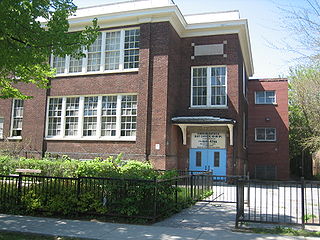
Learning theory describes how students receive, process, and retain knowledge during learning. Cognitive, emotional, and environmental influences, as well as prior experience, all play a part in how understanding, or a world view, is acquired or changed and knowledge and skills retained.
Civics is the study of the rights and obligations of citizens in society. The term derives from the Latin word civicus, meaning "relating to a citizen". The term relates to behavior affecting other citizens, particularly in the context of urban development.

The Sudbury Valley School was founded in 1968 by a community of people in Framingham, Massachusetts, United States. As of 2019, there are several schools that state that they are based on the Sudbury Model in the United States, Australia, Belgium, Canada, France, Germany, Israel, Japan and Switzerland.

A teacher, also called a schoolteacher or formally an educator, is a person who helps students to acquire knowledge, competence, or virtue, via the practice of teaching.

Adult education, distinct from child education, is a practice in which adults engage in systematic and sustained self-educating activities in order to gain new forms of knowledge, skills, attitudes, or values. It can mean any form of learning adults engage in beyond traditional schooling, encompassing basic literacy to personal fulfillment as a lifelong learner. and to ensure the fulfillment of an individual.

Collège des Grands-Lacs was a francophone College of Applied Arts and Technology in Toronto, Ontario, Canada. It was established in 1995 as Ontario's third college specifically serving the Franco-Ontarian population, after La Cité collégiale in Ottawa and Collège Boréal in Sudbury.
Minimally invasive education (MIE) is a form of learning in which children operate in unsupervised environments. The methodology arose from an experiment done by Sugata Mitra while at NIIT in 1999, often called The Hole in the Wall, which has since gone on to become a significant project with the formation of Hole in the Wall Education Limited (HiWEL), a cooperative effort between NIIT and the International Finance Corporation, employed in some 300 'learning stations', covering some 300,000 children in India and several African countries.
A Sudbury school is a type of school, usually for the K-12 age range, where students have complete responsibility for their own education, and the school is run by a direct democracy in which students and staff are equal citizens. Students use their time however they wish, and learn as a by-product of ordinary experience rather than through coursework. There is no predetermined educational syllabus, prescriptive curriculum or standardized instruction. This is a form of democratic education. Daniel Greenberg, one of the founders of the original Sudbury Model school, writes that the two things that distinguish a Sudbury Model school are that everyone is treated equally and that there is no authority other than that granted by the consent of the governed.

Democratic education is a type of formal education that is organized democratically, so that students can manage their own learning and participate in the governance of their school. Democratic education is often specifically emancipatory, with the students' voices being equal to the teacher's.
Critical consciousness, conscientization, or conscientização in Portuguese, is a popular education and social concept developed by Brazilian pedagogue and educational theorist Paulo Freire, grounded in post-Marxist critical theory. Critical consciousness focuses on achieving an in-depth understanding of the world, allowing for the perception and exposure of social and political contradictions. Critical consciousness also includes taking action against the oppressive elements in one's life that are illuminated by that understanding.
One-to-One Institute is a national, non-profit organization that grew out of the Michigan Freedom to Learn (FTL) program. One-to-One Institute helps states and school districts improve student achievement and engagement through one-to-one learning programs.
Globaloria is an online learning platform oriented to K-12 curricula to teach students to design, prototype, and code educational web/mobile games and simulations with industry-standard technology as a means of learning content and creative innovation skills. Globaloria was developed in 2006 by Idit Harel as a project of the World Wide Workshop Foundation with the stated mission of providing all primary and secondary school students in the U.S. with STEM and computing education opportunities. Globaloria is noteworthy among MOOCs as it is based in constructionist learning theory and Harel's research in the MIT Media Lab.
The Tolstoy Foundation is a non-profit charitable and philanthropic organization. It was established on April 26, 1939, by Alexandra Tolstaya, the youngest daughter of the Russian writer Leo Tolstoy, and her friend Tatiana Schaufuss. Its headquarters are in Valley Cottage, New York.
A literate environment may include written materials, electronic and broadcast media and information and communications technology, which encourage literacy acquisition, a reading culture, improved literacy retention and access to information.

The Beach School was a democratic free school in Toronto based on the Sudbury principles of education. The model has two basic tenets: educational freedom and democratic governance. Small and independent, The Beach School was a community of self-motivated learners, aged 4–19, who determined their own curriculum, and each had an equal voice in school governance. Located at 42 Edgewood Ave near Kingston Road and Dundas Street East, the school opened in the fall of 2003 and closed in June 2008 owing to a shortage of students. The Beach School was incorporated as a co-operative and, at the time of closing, was one of two Sudbury schools in Canada; the only one in Ontario.
Student-directed teaching is a teaching technology that aims to give the student greater control, ownership, and accountability over his or her own education. Developed to counter institutionalized, mass, schooling, student-directed teaching allows students to make their own choices while they learn in order to make education much more meaningful, relevant, and effective.
Daniel A. Greenberg, was one of the founders of the Sudbury Valley School, has published several books on the Sudbury model of school organization, and was described by Sudbury Valley School trustee Peter Gray as the "principal philosopher" among its founders. He was a physics professor at Columbia University, and was described by Lois Holzman as the school's "chief 'philosophical writer'".
An ungraded school is a school that does not formally organize students according to age-based grade levels. Students' achievements are assessed by teachers, and each student is individually assigned to one of several fluid groups, according to what the student needs to learn next.

Indigenous education specifically focuses on teaching Indigenous knowledge, models, methods, and content within formal or non-formal educational systems. The growing recognition and use of Indigenous education methods can be a response to the erosion and loss of Indigenous knowledge through the processes of colonialism, globalization, and modernity.







